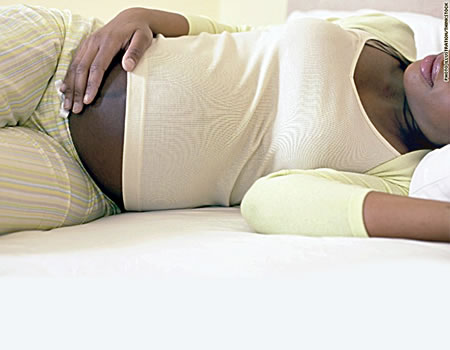Why Mom’s Anaemia Hurts Her Unborn Baby
KAREEM Haruna, 40, recalls that his wife was admitted to the hospital several times during her third pregnancy because the doctor said that she had a condition called anaemia during pregnancy. She had gotten pregnant in quick succession and while she didn’t experience it in her first two pregnancies, the condition reared itself in the third.
Mr Haruna became scared when he learnt that anaemia in pregnancy has led to the death of some pregnant women and their babies whether it is their first pregnancy or they have had other pregnancies before.
Currently, Nigeria is contributing to a large number of cases of anaemia in pregnancy in Africa and one common form of anaemia among pregnant women is iron-deficient anaemia. It is caused by a shortage of iron in the body. The body cannot produce enough haemoglobin for red blood cells without adequate iron.
Despite the use of iron and folate supplementation and medicines to expel worms and prevent malaria in pregnant women in Nigeria’s antenatal policy, the prevalence of anaemia is still high due to higher rates of dietary iron deficiency, inherited blood disorders, nutrient deficiencies and infections such as malaria, tuberculosis, HIV and hookworm.
Iron-folate supplementation is a cost-effective way of reducing iron deficiency anaemia but compliance is poor. Among a sample of 14,740 married women aged 15 to 49 years from the 2018 Nigerian Demographic and Health Survey, type of residence, education, and wealth, among others correlated with compliance with the uptake of Iron-folate tablets to prevent anaemia.
“Studies have put the prevalence of anaemia in pregnancy in Nigeria at between 35 and 75 per cent, depending on where the survey was carried out,” Dr Olayinka Ogunbode, a consultant obstetric and gynaecologist, University College Hospital (UCH), Ibadan, Oyo State, said.
At the UCH, Ibadan, at least one pregnant woman with anaemia in pregnancy is admitted once in two days and sometimes coexists with malaria.
He added, “There has been a marginal increase in the incidence of anaemia in pregnancy in the past three years at the hospital because many could not afford medical care.”
Dr Ogunbode said that anaemia in pregnancy is caused by many factors, but inadequate intake of diets rich in iron or poor nutrition is the commonest in Nigeria.
Moreover, a cross-sectional descriptive study in the Asian Journal of Medicine and Health involving 375 pregnant women seen at the antenatal (booking) clinic of General Hospital, Etinan, between April and October 2018 said anaemia was more in women in the rural area with a low educational status that did not go for antenatal care or with low family income.
In addition, it is more common among married women, those with fewer children or that had not used contraception, slept under insecticide-treated nets, or who had a recurrent fever.
This cross-sectional descriptive study in the Asian Journal of Medicine and Health involved 375 pregnant women seen at the antenatal (booking) clinic of General Hospital, Etinan, between April and October 2018.
The severity of anaemia may vary from one woman to another. It can be mild when the PCV is more than 27 per cent but less than 30 per cent; moderate when it is between 18 and 27 per cent, and severe when it is less than 18 per cent.
Women with mild or moderate anaemia often tend to feel no symptoms and anaemia is detected on screening alone. But as anaemia advances, the symptoms of fatigue, weakness, shortness of breath, frequent sore throats, headache, pica (unusual craving) and decreased appetite may occur.
If untreated, it can increase the risk of serious complications such as fainting spells, preterm delivery and postpartum haemorrhage (excessive bleeding after childbirth). Also, it increases the risk of other life-threatening conditions, such as pre-eclampsia, placental abruption and heart failure.
Women who are anaemic are twice as likely to go into labour early and three times as likely to deliver a baby with a low birth weight. They are twice as likely to die during or shortly after pregnancy compared to those without the condition.
According to a major international study, led by the Queen Mary University of London and published in the journal The Lancet Global Health, if a woman develops severe anaemia at any point in her pregnancy or in the seven days after delivery, she is at a higher risk of dying, making urgent treatment even more important.
Often, women who are iron deficient but not anaemic early in pregnancy can become anaemic due to their increasing need for iron during pregnancy. Their anaemia often isn’t discovered until late in pregnancy, becoming more challenging to treat quickly and efficiently.
According to Dr Ogunbode, their babies are also more likely to be iron-deficient and experience delayed growth; and if this is not addressed appropriately, the baby can die. That is called intrauterine foetal death.
The choice of treatment for anaemia during pregnancy, he declared depends on the severity of anaemia or the duration of pregnancy and time available for delivery.
While a good diet, iron tablets, folic acid and vitamin C are prescribed in mild to moderate cases, pregnant women with severe anaemia will require a blood transfusion.
Dr Ogunbode added, “In their treatment too, we must treat any other underlying condition.”

